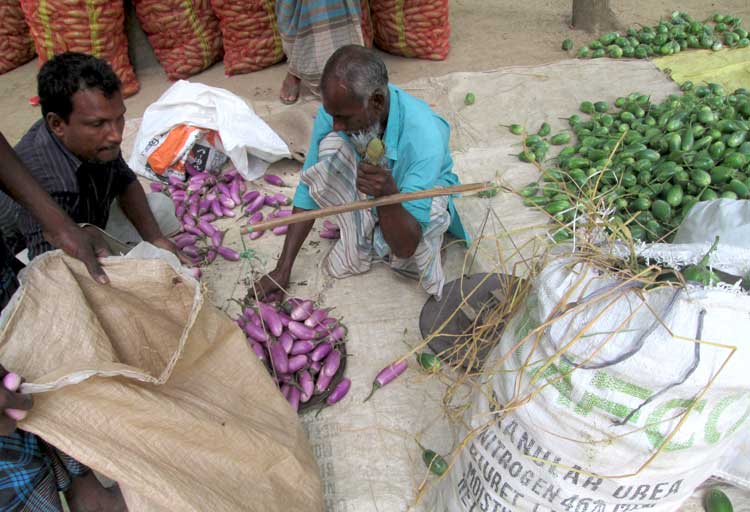
M. A. Sobhan
BARI has miserably failed in its attempt to show that Bt brinjal is resistant to fruit and shoot borer (see the series of article in UBINIG).
It should have been investigated by independent qualified geneticists, entomologists and agronomists in order to unveil the mode of inheritance and heritability of attributes linked with FSB (Leucinodes orbonalis).The BARI, claiming to be one of the most prestigious institution of Bangladesh, is now lost its vision, blindly following the political directives instead of scientific wisdom. Such mindless act of dealing with transgenic plants like Bt brinjal containing gene from Bacillus thuringiensis may create havoc for Bangladesh Agriculture. Bangladesh is an eye-opener for all, for or against GMOs, where the unholly alliance between corporations, scientists, government and international development agencies indulges in unethical practices not acceptable to scientific community legally, ethically and scientifically. The unholy alliance between Cornell University, USAID, BARI and Monsanto and Mahyco has set a bad example of science and their arrogant disregard of the precautionery principle. Even the least seven conditions of approval by the Ministry of Environment were also ignored and violated. Despite the shameful failure BARI is still going ahead with its program for introduction and extension of Bt brinjal disregarding all oppositions from scientific and public community.
Mansanto, Mahyco and BARI nexus have used four of the most popular varieties of brinjal namely Uttara, Kajla, Nayontara and ISD 006 of Bangladesh.These are popular national varieties and are widely grown by farmers in different parts of Bangladesh. The BARI has released the four Bt brinjal varieaties in the name of BARI Bt brinjal-1 (Uttara), BARI Bt brinjal-2 (Kajla ), BARI Bt brinjal-3 (Nayantara) and BARI Bt brinjal-4 (ISD006). BARI has given four names for the four transgenic brinjal but without any marker characters. There is no distinguishing character between the original variety and the transgenic version from seed to seed.
As consumers, the people of Bangladesh have every right to select the non-GM original variety against the questionable health impacting GM version matching the freedom of choice of consumers. Moreover, BARI has used four of the popular national brinjal varieties developed from the land races. BARI is now under legal obligation to have phenotypically distinguishable characters for the four Bt brinjal varieties for every stage of growth and development of the plants up to the cooked brinjal on the plates. This is because labeling empowers the buyers in order for choosing between products with or without genetically modified organisms. The consumers need transparent and straight forward labeling based on peoples right to information on the food they eat.
Section 2 (20) (c) of the consumers Right Protection Act 2009 of Bangladesh states “Selling or offering to sell any product which has mixture of any object that is dangerously harmful for human health and mixture of such object with food is prohibited by any Act of Rule”.
Mandatory labeling of GM food is enjoyed by 63 countries across the globe including Europe, Russia, China, India, South Africa, Saudi Arabia and USA.
The basic right to life is linked with right to food. It implies that any food must be safe. The GoB is obligated to protect the basic right of citizens to safe food on account of its constitution as well as international human rights convention.
The permission that was accorded to the BARI for confined trial of Bt brinjal through 20 selected farmers but did not give permission for open market sell of the same without labeling. This is gross violation of the safe food Act 2013, article31.
Genetically Modified food, Organic food, Applied food Proprietary food, etc: Any person or any person on his behalf, directly or indirectly, cannot produce, import, process, store, supply or sell Genetically Modified Food or refined food, organic food, irradiated food, proprietary food unique food, useful food, applied food, dietary food, nutricitical and such other foods without taking approval under specific terms of reference of the provisions of existing Law.
[(৩১। বংশগত বৈশিষ্ট পরিবর্তনকৃত খাদ্য, জৈব-খাদ্য, ব্যবহারিক খাদ্য, স্বত্বাধিকারী খাদ্য ইত্যাদি। কোন ব্যক্তি বা তাহার পক্ষে নিয়োজিত অন্য কোন ব্যক্তি, প্রত্যক্ষ বা পরোক্ষভাবে, পবিধান দ্বারা বা আপাতত: বলবৎ অন্য কোন আইনের অধীন নির্ধারিত পদ্ধতিতে অনুমোদন গ্রহণ ব্যতিরিকে বংশগত বৈশিষ্ট) পরিবর্তনকৃত বা সংশোধিত খাদ্য, জৈব খাদ্য, কিরন-সম্পাতকৃত খাদ্য (irradiated food),স্বত্বাধিকারী খাদ্য, অভিনব খাদ্য, ব্যবহারিক খাদ্য, বিশেষ পথ্য হিসাবে ব্যবহৃত খাদ্য নিউট্রাসিউটিকাল এবং উক্তরূপ অন্যান্য খাদ্য উৎপাদন, আমদানি, প্রক্রিয়াকরণ, মজুদ,সরবরাহ বা বিক্রয় করিতে পারিবেনা। ২০১৩ সনের ৪৩ নং আইন, নিরাপদ খাদ্য আইন ২০১৩, অনুচ্ছেদ ৩১।)]
Regulations for GMO and GM food in Bangladesh
Experimental and commercial release:
The Ministries of Agriculture, Science and Information Technology and Environment and Forest are jointly responsible for the development of a biotechnology policy and regulatory framework. In 2006 Bangladesh approved a National Biotechnology Policy that emphasizes protection of indigenous knowledge, collective innovation and community right.
The Bio-safety Guidelines of the country provide for a decision making framework that allows for experimental field-testing based on: the testing agency’s familiarity with the plant; and the perceived environmental impact should the GM plant escape confinement.
Marketing approval:
Bangladesh has not yet got any legal provision for marketing of GM crops.
Labeling: Labeling of GM food crop is required for indicating that it is Genetically Modified. Labeling of GM is required for respecting consumers, choice on account of food safety. Bangladesh needs to develop labeling protocol before commercial release of any GM crops. It is worth mentioning in this context that the BARI was given permissionfor limited field cultivation of four Bt brinjal varieties by the selected farmers. The authority did not give permission for mass commercial release and open market sell of Bt brinjal. The open market sell of Bt brinjal by the farmers is violation of the terms of reference of the approval. So government should take immediate action to withdraw Bt brinjal from the market.